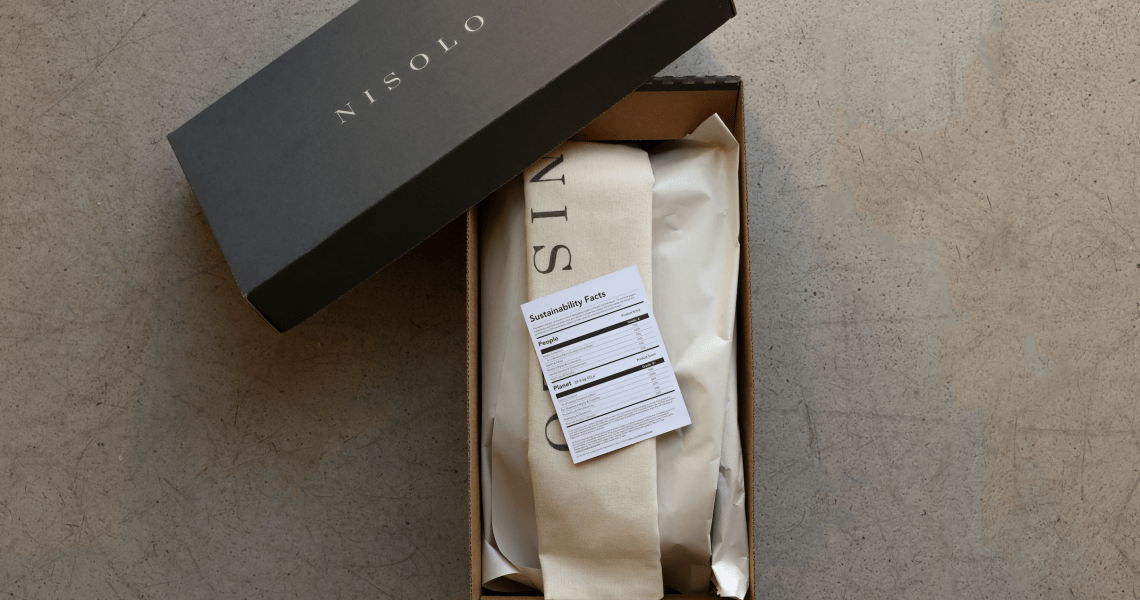Nashville-based footwear brand Nisolo is bringing a simple nutrition-label format to the fashion industry, in the name of facilitating transparency.
Over the last decade, Nisolo has been working with its factories across Peru, Mexico, Kenya and the United States to bring living wages to 100% of its workers. Now, this week, it launched its Sustainability Facts Label as a next step. The idea is to deliver to customers an accurate assessment of how it’s treating its workers and the planet. As of this week, Nisolo is placing the label on every one of its products, with varying percentage scores and overall grades given for different focus areas across people and planet.
Patrick Woodyard, CEO of Nisolo, said the label is a way to inform consumers, in a tangible way, about their products. “Very few people recognize that the fashion industry is one of the most polluting industries in the world and that it commits more carbon emissions than international shipping and aviation combined,” he said. “From a people perspective, less than 5% of global workers that make our clothing earn a living wage. The reality is that most consumers have almost no recognition, no knowledge of what happens to their product before it arrives at their doors.”
Upon review of 26 different social and environmental impact assessments that are currently used across the industry, Nisolo found that there’s not enough focus placed on issues like women’s empowerment, health care and benefits, or third-party verifications for claims around carbon neutrality, for example. Data points that are weighed to determine a brand’s treatment of workers, factory conditions, supply chain transparency and impact are usually limited to six or less. What Nisolo is doing differently is in the way it forms its data points, factoring nearly 200 impact data points across both people and planet.
But many brands are still hesitant to go the route of Ganni, which publicly discloses that it is not sustainable, but is instead working across its focus impact areas to drive change. It shares that it’s “working at it”. Meanwhile, the EU is working on a digital product passport to enhance the reuse and recycling of goods within the European market.
For its part, Nisolo’s label methodology of breadth, depth and simplicity is being open-sourced, allowing any brand to make use of the sustainability label to quickly increase its production transparency. But waiting for unification from governments and commissions takes time — the education process should begin earlier. “We’ve spent the last three-and-a-half to four years developing this label, specifically to offer to the industry something to build upon that better raises awareness for consumers,” said Woodyard.
Nisolo is also helping consumers become advocates by calling on them to share the Nisolo #SustainabilityFactsLabel on social media and with their community, invite their favorite brands to embrace transparency and adopt the sustainability facts label.
Ad position: web_incontent_pos1
For consumers, it would be easy to get confused by all of brands’ terms for sustainability and the lack of regulations in the space. From greenwashing to proving unclear information around sourcing, brands are not providing consumers with the information needed to understand the impact of their own clothing or the actions of the brands that make it.
Unlike the terms of Kate Raworth’s doughnut economy, which show that social sustainability is of equal importance to carbon emissions and improved biodiversity, most fashion industry certifications do not take everything into account. However, interest in transparency is rising, with the latest Avery Dennison report published this week showing that 60% of shoppers want more transparency about the production journey their clothes have been on, so they can make ethical purchasing decisions.




